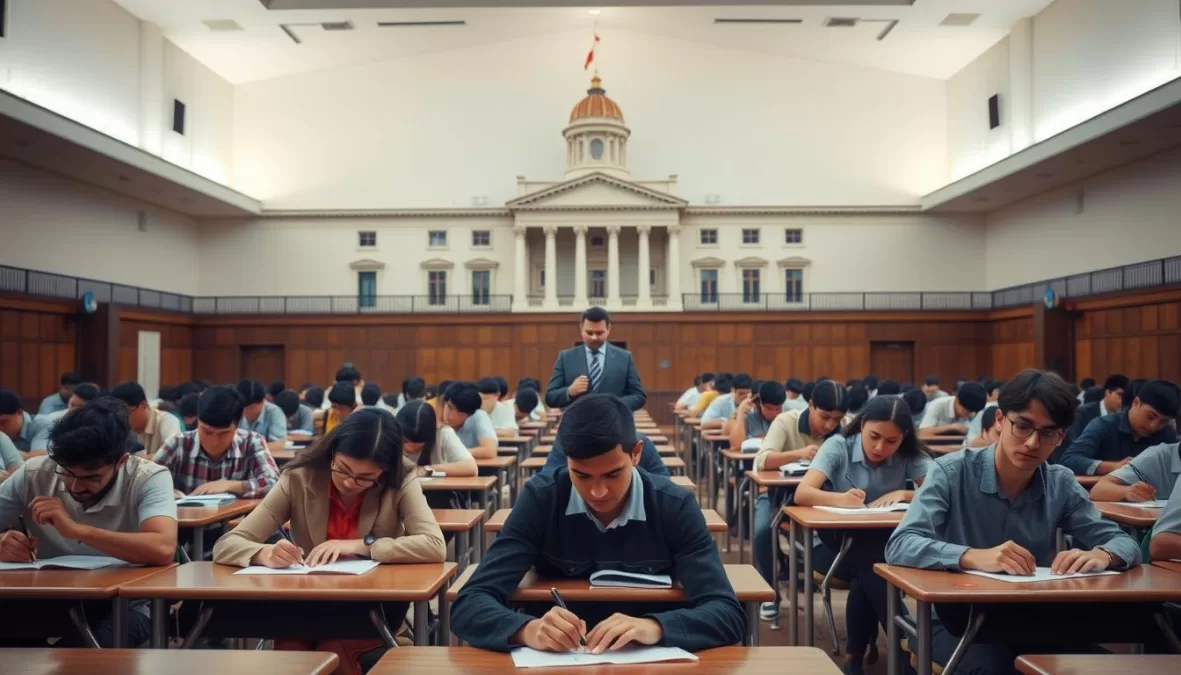For many students in India, securing a stable career path is a top priority. Government jobs offer an attractive option due to their stability, competitive salaries, and excellent benefits. The intense competition for these positions is fueled by the limited availability of government jobs, making it essential for students to understand their options.
Various exams are conducted by different government agencies, such as the Staff Selection Commission (SSC), Railway Recruitment Board, and defense sector organizations. These exams provide opportunities for students who have completed their 12th standard to secure government jobs without requiring extensive higher education.
Understanding the exam patterns, preparation strategies, and benefits of choosing government sector employment early in your career can help you make informed decisions about your professional future.
Key Takeaways
- Government jobs offer stability and competitive salary packages.
- Various government exams are conducted by different agencies.
- 12th pass students can target these exams without higher education.
- Understanding exam patterns and preparation strategies is crucial.
- Government sector employment offers excellent benefits.
Understanding the Appeal of Government Jobs in India
The appeal of government jobs in India can be attributed to several factors that make them highly desirable. Government jobs offer a unique combination of benefits that are hard to find in the private sector.
Job Security and Stability
One of the primary reasons government jobs are so appealing is the job security and stability they offer. Government employees enjoy a high level of job security, with minimal risk of layoffs or sudden terminations. This stability allows them to plan their lives and careers with confidence.
Attractive Salary and Benefits
Government jobs are also known for their attractive salary packages and benefits. Employees receive a competitive salary, along with various allowances and perks, such as medical benefits, housing allowances, and travel concessions. The total compensation package is often more comprehensive than what is offered in the private sector.
Work-Life Balance
Another significant advantage of government jobs is the work-life balance they provide. Government jobs typically have fixed working hours, paid leaves, and a better work-life balance compared to private-sector jobs. Here are some key aspects:
- Structured working hours, typically 9-5 or 10-6, providing predictability and routine.
- Numerous gazetted holidays, casual leaves, earned leaves, and medical leaves as part of their annual leave entitlement.
- Moderate work pressure compared to high-stress private sector environments.
- Strict observance of weekends off, ensuring dedicated personal time.
To illustrate the benefits of government jobs, let’s compare some key aspects:
| Job Aspect | Government Jobs | Private Sector Jobs |
|---|---|---|
| Job Security | High | Variable |
| Work-Life Balance | Better | Variable |
| Salary and Benefits | Competitive | Variable |
In conclusion, government jobs in India offer a unique combination of job security, attractive salary packages, and work-life balance, making them highly appealing to many individuals.
Why Consider Easy Government Jobs After 12th?

Easy government jobs after 12th are an attractive option for those looking to start their career early. Many students after completing their 12th standard look for immediate employment opportunities that can provide them with financial stability and a secure future.
Early Career Start
One of the significant advantages of pursuing government jobs after 12th is the ability to start one’s career early. Unlike many professional courses that require further education, these jobs allow candidates to enter the workforce immediately after completing their 12th exams.
Lower Competition Levels
Government exams like SSC MTS and Railway Group D have a relatively lower competition level compared to other exams that require a higher educational qualification. This makes it easier for 12th pass candidates to secure a job.
Minimal Educational Requirements
The educational requirements for these government jobs are minimal, with many positions requiring only a 12th standard certificate. This eliminates the need for additional formal education, making these jobs accessible to a wider range of candidates.
Some key benefits of these jobs include:
- Many government positions require only a 12th standard certificate as the minimum educational qualification, making them accessible without further formal education.
- Exams like SSC MTS, Railway Group D, and Postal GDS specifically cater to 12th pass candidates, providing direct entry into government service.
- The syllabus for these exams typically covers fundamental subjects taught up to 12th standard, eliminating the need for specialized knowledge.
- Most of these government exams focus on testing basic aptitude, reasoning, and general awareness rather than advanced subject knowledge.
- Age eligibility for many of these positions starts at 18 years, allowing fresh 12th pass students to apply immediately.
- The straightforward eligibility criteria remove barriers to entry that might exist in other career paths requiring specific degrees or specializations.
- This accessibility makes government jobs an excellent option for students who prefer practical work experience over extended academic pursuits.
By considering easy government jobs after 12th, candidates can embark on a stable and secure career path early in their lives. These jobs not only provide financial stability but also offer a sense of security and respect that comes with being a government employee.
Staff Selection Commission (SSC) Opportunities
For those looking to start their career early, the Staff Selection Commission (SSC) is a gateway to various government job opportunities. The SSC is responsible for recruiting candidates for numerous posts in different government departments and ministries.
SSC CHSL (Combined Higher Secondary Level)
The SSC CHSL exam is conducted to recruit candidates for various posts such as Lower Division Clerk (LDC), Data Entry Operator (DEO), and Court Clerk. The selection process includes a tiered examination system, comprising computer-based exams and a typing test or skill test.
Key Highlights:
- Recruitment for various clerical posts in government departments.
- Tiered examination system for selection.
- Opportunities for candidates with a higher secondary qualification.
SSC MTS (Multi-Tasking Staff)
The SSC MTS exam recruits candidates for the post of Multi-Tasking Staff in various government departments. The role involves performing a variety of tasks as assigned by the department.
Key Highlights:
- Wide range of job opportunities across different government departments.
- Simple selection process involving a computer-based exam.
- Opportunities for promotion to higher posts.
SSC Stenographer Grade C & D
The SSC Stenographer exam is conducted to recruit stenographers for Grade C and D positions. Stenographers are required to have shorthand skills and typing proficiency.
Key Highlights:
- Recruitment for stenographer positions in government departments and courts.
- Selection process includes a written exam followed by a skill test.
- Salary scales range from ₹5,200-20,200 for Grade D and ₹9,300-34,800 for Grade C.
- Opportunities for promotion to higher grades.
The SSC provides a range of opportunities for individuals looking to secure government jobs. With various exams catering to different skill sets and qualifications, candidates can choose the path that best suits their career aspirations.
Railway Recruitment Board (RRB) Positions
The Indian Railways, through the Railway Recruitment Board (RRB), opens up various avenues for young aspirants after 12th. With a multitude of roles available, RRB offers a promising start to a career in the government sector.
RRB Group D
RRB Group D is one of the most popular recruitment exam processes conducted by RRB. It encompasses various posts such as Track Maintainer, Helper/Assistant, and more. Candidates who have completed their 12th can apply for these government jobs, making it an attractive option for those looking to start their career early.
Railway NTPC (Non-Technical Popular Categories)
The Railway NTPC exams are conducted for recruiting candidates in various non-technical positions such as Clerks, Accountants, and more. The recruitment process involves multiple stages, including Computer Based Tests (CBT) and skill assessments. This is a highly competitive exam that requires thorough preparation.
Assistant Loco Pilot (ALP)
The Assistant Loco Pilot (ALP) position is a prestigious technical role in Indian Railways that 12th pass students with science backgrounds can apply for. The job involves assisting the Loco Pilot (train driver) in operating trains, monitoring engine parameters, and ensuring safe train operations. The selection process includes two stages of Computer Based Tests (CBT1 and CBT2), followed by a Computer Based Aptitude Test and document verification.
As per the given data, successful candidates receive placement in Level 2 of the 7th Pay Commission matrix (₹19,900-63,200) plus additional allowances. The position offers excellent career growth opportunities, with ALPs eligible for promotion to Loco Pilots after gaining experience and clearing departmental exams. This is one of the few technical government positions accessible to 12th pass candidates without requiring an engineering degree.
RRB recruitment process is known for its transparency and fairness, making it a trusted pathway for government jobs. With various vacancies and posts available, RRB continues to be a significant employer in the Indian job market.
Defense Sector Opportunities
After completing their 12th, aspiring candidates can explore multiple entry schemes in the Indian defense sector. The defense sector offers a range of career opportunities that are both challenging and rewarding.
National Defense Academy (NDA)
The National Defense Academy (NDA) is a premier defense service training institute that provides training to candidates for the Indian Army, Navy, and Air Force. To be eligible, candidates must pass the NDA exam, which is conducted twice a year. Successful candidates undergo rigorous training, developing skills that are valuable both in military and civilian careers.
Indian Army Soldier Recruitment
The Indian Army recruits soldiers through various exams and selection processes. Candidates who have completed their 12th can apply for positions such as Soldier General Duty or Soldier Technical. The selection process includes written exams, physical fitness tests, and medical examinations, ensuring that only the most capable candidates are selected.
Indian Navy and Air Force Openings
The Indian Navy and Air Force offer specialized entry schemes for 12th pass candidates, providing technical and non-technical career paths. For instance, the Navy recruits Sailors through the Senior Secondary Recruits (SSR) exam for science students, while the Air Force recruits Airmen through the Agniveervayu program.
“The Agniveervayu program is an exciting opportunity for young candidates to serve the nation and gain valuable technical skills.”
Both services offer structured training programs that enhance future employability, with competitive salary packages starting at approximately ₹30,000 per month plus allowances.
Government exams for defense sector positions, such as the Indian Navy Exam for Sailor, Artificer Apprentice, and Senior Secondary Recruits (SSR), and the Indian Coast Guard Exam for various posts, are crucial for candidates to prepare for. Effective preparation involves understanding the exam pattern, using the right study materials, and managing time efficiently. Candidates should focus on the selection process, which typically includes written exams testing basic science, mathematics, and English, followed by physical fitness tests and medical examinations.
Security Forces Recruitment
Completing 12th standard opens the door to various recruitment opportunities in India’s security forces. The government offers numerous exam opportunities for candidates to join prestigious forces, ensuring a stable and secure career.
Border Security Force (BSF)
The Border Security Force (BSF) is one of the primary security agencies that recruit candidates after their 12th standard. The BSF is responsible for guarding India’s international borders and maintaining peace in the border areas. Recruitment exams are conducted regularly for various positions, including Constable and Head Constable roles.
Central Reserve Police Force (CRPF)
The Central Reserve Police Force (CRPF) is another significant security agency that offers job opportunities to 12th pass candidates. The CRPF is involved in maintaining law and order, assisting in civil administration, and participating in counter-insurgency operations. The recruitment process includes a written exam, physical tests, and medical examinations.
Other Security Agencies
Beyond BSF and CRPF, several other security agencies offer excellent career opportunities for 12th pass candidates through accessible recruitment exams. These include:
- The Central Industrial Security Force (CISF), which recruits Constables for industrial security, airport security, and VIP protection duties.
- The Indo-Tibetan Border Police (ITBP), which offers positions guarding the Indo-China border with special allowances for high-altitude postings.
- Sashastra Seema Bal (SSB), which protects the Indo-Nepal and Indo-Bhutan borders and recruits 12th pass candidates for Constable positions.
These security agencies provide stable government employment with the added benefit of serving the nation’s security interests. Candidates should prepare well for the recruitment exams to secure a position in these prestigious forces.
Banking and Insurance Sector Jobs
Banking and insurance sector jobs are attractive options for individuals seeking secure and rewarding careers. These sectors offer a range of opportunities, from clerical positions to specialized roles, with government-backed job security and benefits.
IBPS Clerk Examination
The Institute of Banking Personnel Selection (IBPS) conducts the Clerk examination to recruit candidates for clerical positions in public sector banks. This exam is a gateway to a stable career with opportunities for growth.
Key aspects of the IBPS Clerk Examination include:
- Online application process
- Preliminary and Main exams
- Syllabus covering Reasoning, Quantitative Aptitude, English Language, and General Awareness
LIC Assistant and ADO Positions
The Life Insurance Corporation of India (LIC) offers two accessible entry-level positions for graduates: Assistant Administrative Officer (AAO) and Apprentice Development Officer (ADO). These roles are crucial for the functioning of LIC and offer a promising career start.
The LIC ADO position focuses on marketing and business development, with a significant component of incentives beyond the fixed salary. The selection process involves Prelims, Mains, and a Personal Interview.

| Position | Salary Scale |
|---|---|
| IBPS Clerk | ₹14,000 – ₹20,000 per month |
| LIC Assistant | ₹14,435 – ₹25,000 per month |
| LIC ADO | ₹17,000 (basic pay) + commission |
Both banking and insurance sectors offer excellent job security, being part of government-owned institutions with a long history of stability. Preparation for these exams can often overlap, with similar study materials and mock tests being used for both sectors.
Postal Department Opportunities
Exploring government job opportunities in the Postal Department can be a rewarding career move. The Postal Department offers various roles that are not only stable but also provide a chance to serve the community.
Postal Assistant/Sorting Assistant
The Postal Assistant/Sorting Assistant role is a significant position within the Postal Department. Candidates selected for this post are responsible for managing postal operations, including sorting and delivering mail. The selection process for this role typically involves a competitive exam.
To prepare for the exam, candidates can focus on improving their knowledge of current events, mathematics, and reasoning skills.
Gramin Dak Sevak (GDS)
The Gramin Dak Sevak (GDS) position is another opportunity available in the Postal Department. GDS serves rural post offices, handling mail delivery and other postal services. The selection for GDS is based on merit, using the candidate’s 10th-grade marks.
- The GDS role offers a monthly allowance ranging from ₹10,000 to ₹14,500, depending on the post office’s category and workload.
- GDS workers receive various benefits, including service discharge benefits and cycle maintenance allowances.
- This position is ideal for those who wish to serve in rural areas, as GDS are typically appointed to their own or neighboring villages.
After gaining experience as a GDS, candidates can apply for departmental exams to become regular Postal Assistants with full government employee status.
Preparation Strategies for Government Exams
Preparing for government exams after 12th involves understanding the exam pattern, using the right study materials, and managing time effectively. To succeed in these exams, it’s crucial to have a well-planned preparation strategy that covers all aspects of the exam syllabus.

Understanding Exam Patterns
Understanding the exam pattern is the first step towards effective preparation. It involves familiarizing yourself with the syllabus, the types of questions asked, and the marking scheme. This knowledge helps in creating a focused study plan.
Effective Study Materials
Choosing the right study materials is crucial for government exam preparation. This includes textbooks, online resources, and mock tests. Practicing with previous years’ question papers and taking mock tests can significantly improve your speed and accuracy, which are crucial for success in competitive exams like those for civil services.
Time Management Tips
Effective time management is often the deciding factor between success and failure in government exams. Creating a realistic study timetable, implementing the Pomodoro Technique, and practicing with timed mock tests are some strategies that can help. It’s also important to balance preparation with adequate rest to prevent burnout.
By adopting these strategies, candidates can enhance their preparation and increase their chances of success in government exams.
Conclusion
For students looking to start their career early, government jobs are an attractive choice. The various exams available after 12th standard offer a range of opportunities across different sectors.
Pursuing government jobs after 12th standard is a practical and accessible career path. The exams discussed, from SSC opportunities to Railway positions and Defense sector openings, provide varied options catering to different interests and career aspirations.
While these government exams are relatively easier to crack compared to graduate-level competitive exams, they still require dedicated preparation and strategic planning. The benefits of securing these positions extend beyond job security to include competitive salaries and excellent work-life balance.
Many successful government employees started their careers after 12th standard and achieved significant professional growth. For students concerned about financial constraints, these opportunities provide a viable alternative that allows earning while learning.
As you embark on your government job preparation journey, remember that consistency, focused preparation, and strategic exam selection are key. With determination and the right approach, you can join the ranks of millions of satisfied public sector employees who have found stability and fulfillment in serving the nation.




